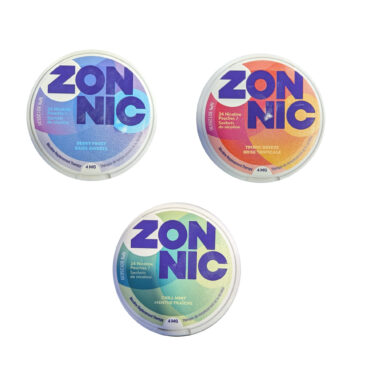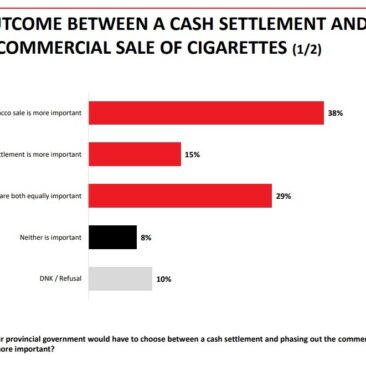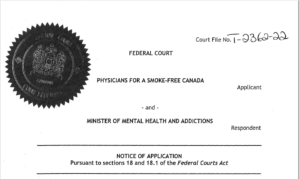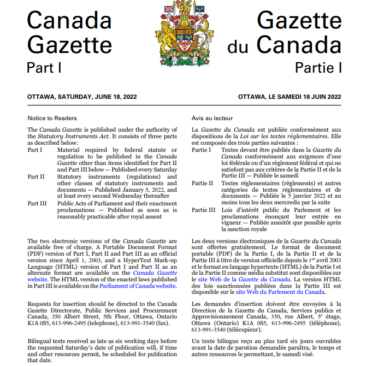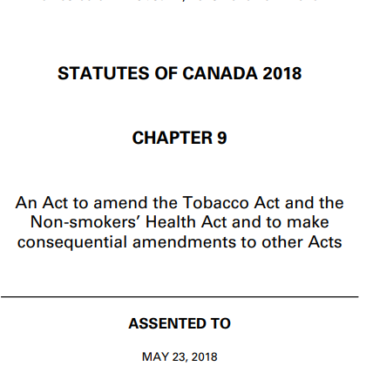What looks like a cigarette, tastes like a cigarette and smells like a cigarette but is not regulated like a cigarette?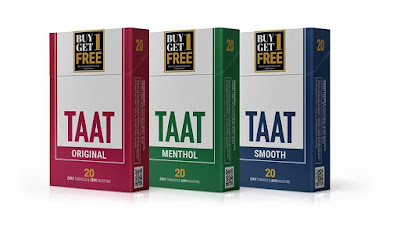
Meet TAAT, a hemp-based cigarette look-alike. Made by a Canadian company, designed by Philip Morris International alumni, and now being test-marketed in the U.S.A., TAAT are nicotine-free ‘cigarettes’ that promise a realistic smoking experience. And, yes, the company has announced its plans to sell them in Canada.
The selling proposition:
No nicotine. All flavour. Beyond tobacco. These cigarettes are marketed to consumers as a celebration of smoking without the head-rush: “Between the tobacco-like taste and smell of the Beyond Tobacco™️ base material, the sight of smoke, the “crackling” sound of TAAT™ burning, and the physical sensations of inhaling and exhaling as well as flicking ashes, no detail has been overlooked in creating a satisfying experience for smokers.”
Just as the hemp has been modified to maintain and reinforce the distinctive tobacco smoking experience, the marketing is designed to maintain and reinforce the iconoclastic imagery of cigarette smoking. TAAT’s retro-hipster ads evoke a time when cigarettes were uncomplicated by health considerations, and they model defiant attitudes about smoking.
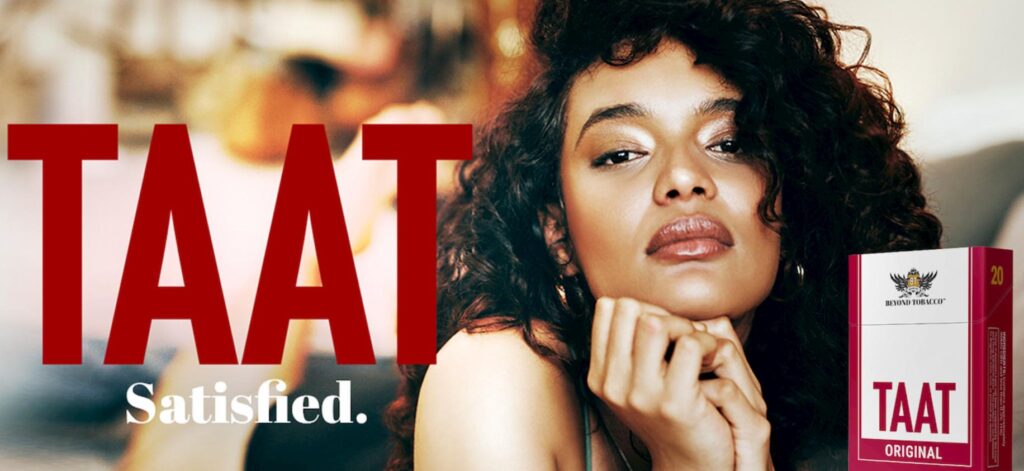 Another off-shoot of Big Tobacco
Another off-shoot of Big Tobacco
TAAT cigarettes blur the lines between cannabis- and tobacco-products. This is not the first company to enter this space. As discussed in a previous post, British American Tobacco is currently test-marketing CBD pods for its vaping products, and Philip Morris has also signalled its intention to go “beyond nicotine” into other (yet unspecified) botanicals. As with these other ventures, TAAT is an expansion of the tobacco trade: The people behind TAAT were until recently developing Philip Morris products and distribution systems.
Another ‘harm reduction’ commercial product
These cigarettes are yet another attempt to gain commercial advantage from harm reduction. Like vaping products, heated tobacco and modern oral, hemp cigarettes (and oral hemp), are marketed as a way for smokers to change their drug use without abandoning it. Commercialized harm reduction is running in two directions: e-cigarette manufacturers make money by encouraging people to access nicotine without tobacco, and TAAT offers hemp for those who want to smoke while avoiding tobacco and nicotine.
Canada’s TAAT-friendly regulatory environment
TAAT is headquartered in an industrial park in Toronto (345 Horner Avenue, Toronto, ON M8W 1Z6) and its official address (Suite 180-789 West Pender Street) is shared with a number of resource extraction and cannabis companies, including its Canadian distribution partner, Christina Lake Cannabis.
Its recent annual report (filed last month with SEDAR) reports that this company was recently grafted onto the roots of a failed venture in resource extraction: “The Company was incorporated on June 5, 2006, in British Columbia under the Business Corporations Act (British Columbia). The Company was historically in the business of exploring for or purchasing economically viable oil and gas resource deposits. On October 31, 2018, the Company suspended substantially all production operations as a result of extreme volatility within the commodity markets, regional supply and demand and decided not to proceed with these leases and as a result the oil and gas operations have been recorded as discontinued operations. In January 2020, the Company ceased to carry on its business as an oil & gas exploration company, and changed its principal business to the manufacturing and distribution of a nicotine-free and tobacco-free alternative to tobacco cigarettes that has been developed to closely mimic the experiential components of smoking legacy tobacco products.”
TAAT is listed on the Canadian Stock Exchange, a regulation-light alternative stock market that offers “reduced barriers to listing.” Because Canadian security laws make it easier for this company to raise the capital to sell these products, and impose fewer reporting requirements on it.
Cracks between Health Canada’s regulatory systems
Smoking products that do not contain tobacco or nicotine or cannabis (like herbal cigarettes or herbal shisha) are considered consumer products and are subject to the federal Consumer Product Safety Act. Although this law forbids manufacturers from selling products that are “a danger to human health or safety”, this prohibition is applied only with respect to immediate danger. (On this basis, the department rejected the 2013 request by Physicians for a Smoke-Free Canada for controls on herbal shisha.)
Herbal cigarettes are regulated by Health Canada – but not in the context of tobacco control.
Smoking products that do not contain tobacco or nicotine or cannabis (like herbal cigarettes or herbal shisha) are regulated as consumer products and are subject to the federal Consumer Product Safety Act. Although this law forbids manufacturers from selling products that are “a danger to human health or safety”, this prohibition is interpreted as causing immediate danger. (In 2013, Physicians for a Smoke-Free Canada provided Health Canada with evidence of the dangers associated with smoking shisha and unsuccessfully requested that the government require the product to be withdrawn from the market.)
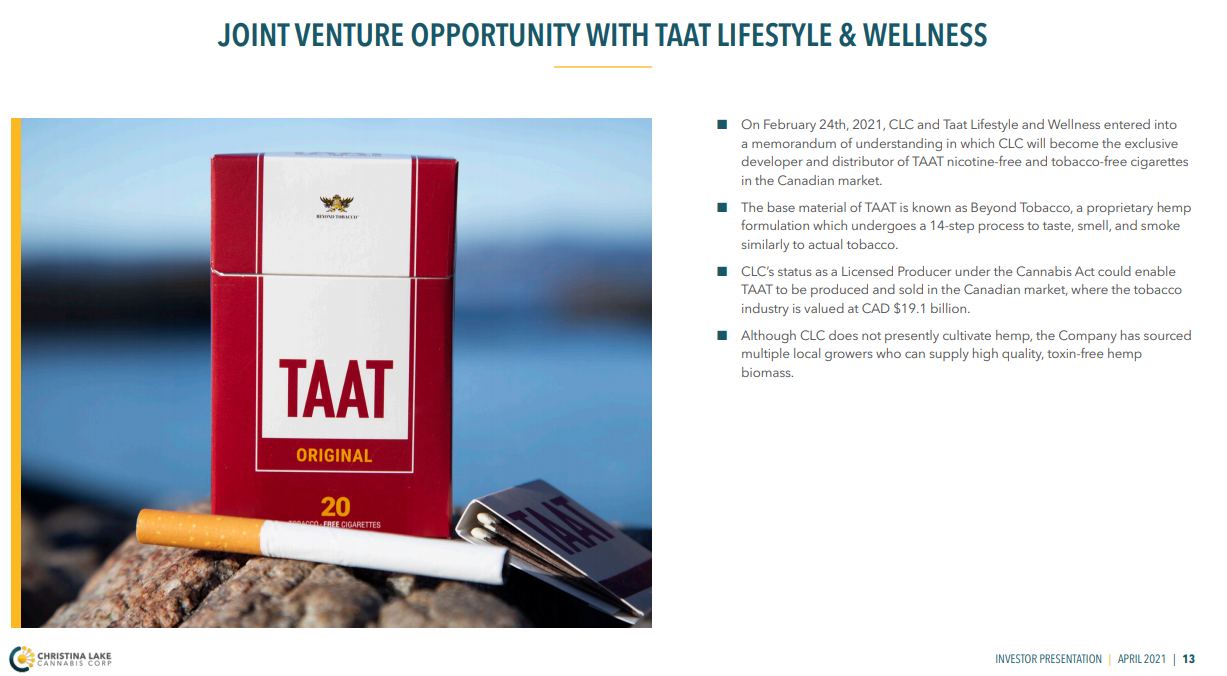 Smoking products that contain hemp are subject to the federal Cannabis Actand its regulations for industrial hemp, and also to any provincial regulations on the sale of hemp products. Christina Lake Cannabis Corporation, which will be developing and distributing TAAT cigarettes in Canada, has informed investors that currently holds the license to do so. “CLC’s status as a Licensed Producer under the Cannabis Act could enable TAAT to be produced and sold in the Canadian market… Although CLC does not presently cultivate hemp, the Company has sourced multiple local growers who can supply high quality, toxin-free hemp biomass.”
Smoking products that contain hemp are subject to the federal Cannabis Actand its regulations for industrial hemp, and also to any provincial regulations on the sale of hemp products. Christina Lake Cannabis Corporation, which will be developing and distributing TAAT cigarettes in Canada, has informed investors that currently holds the license to do so. “CLC’s status as a Licensed Producer under the Cannabis Act could enable TAAT to be produced and sold in the Canadian market… Although CLC does not presently cultivate hemp, the Company has sourced multiple local growers who can supply high quality, toxin-free hemp biomass.”
Herbal cigarettes that are marketed as cessation products are subject to the Natural Health Products Regulations. Because TAAT is marketed as a harm reduction product and not a cessation aid, these regulations are unlikely to apply.
Health Canada has acknowledged that herbal cigarettes are unsafe products (“Health Canada does not recommend using these cigarettes as a long-term alternative to tobacco cigarettes due to the danger posed by the inhalation of smoke of any kind.”) and reports that it is “tracking the use and sales of these products to determine the level of use, changes over time and whether any action is required.”
TAAT’s advertisers face few regulatory barriers in Canada.
TAAT products are currently advertised in the USA through lifestyle ads, testimonials and event sponsorships – promotions that are illegal in Canada for cannabis or tobacco products.
Because they are hemp products, it appears unlikely that TAAT cigarettes will be subject to advertising restrictions, such as those for tobacco products, for non-hemp cannabis products or for therapeutic products. At a federal level, the only prohibition is that they cannot be marketed as having psychoactive properties. At a provincial level, only Quebec has a tobacco law designed to include products other than tobacco cigarettes. (Regulations under Quebec’s Tobacco Control Act establish that “for the purposes of the Tobacco Control Act (chapter L-6.2), any product that does not contain tobacco and is intended to be smoked is considered to be tobacco.”)


